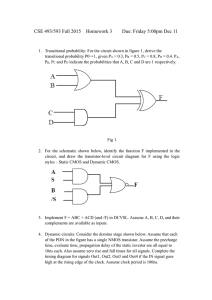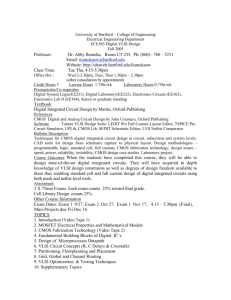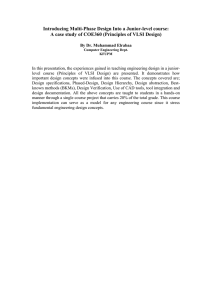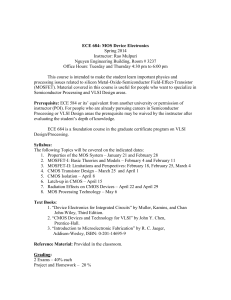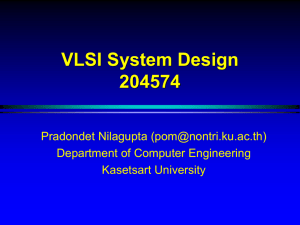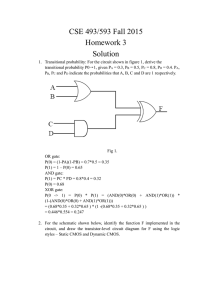MEng Courses for Electrical‐Computer Stream
advertisement
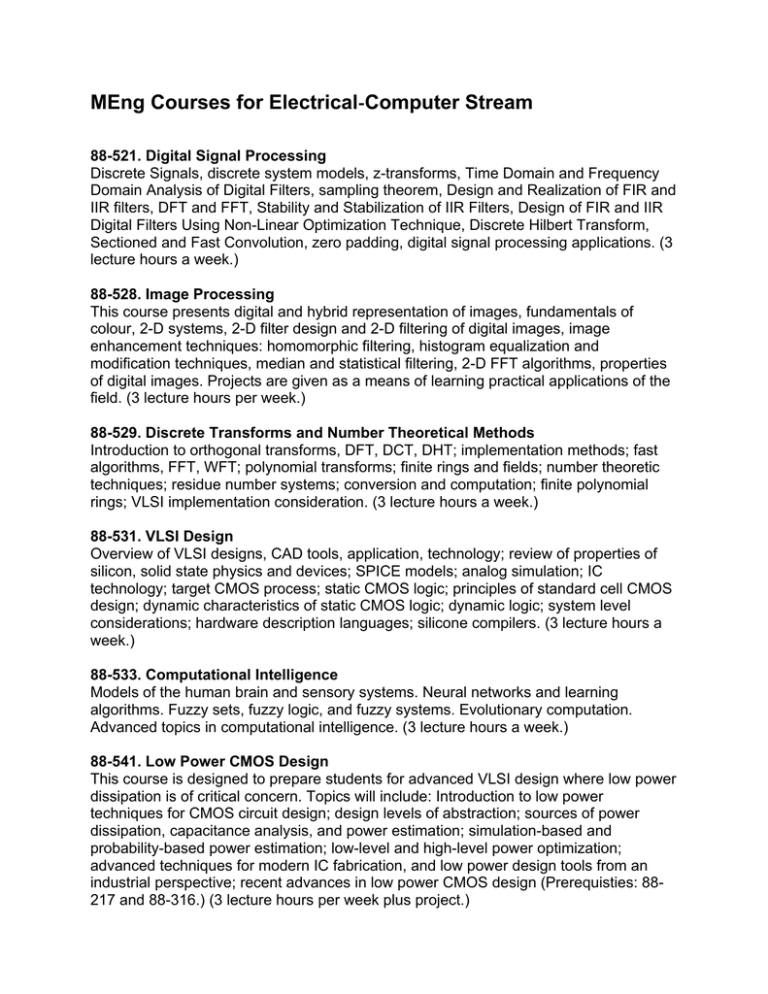
MEng Courses for Electrical‐Computer Stream 88-521. Digital Signal Processing Discrete Signals, discrete system models, z-transforms, Time Domain and Frequency Domain Analysis of Digital Filters, sampling theorem, Design and Realization of FIR and IIR filters, DFT and FFT, Stability and Stabilization of IIR Filters, Design of FIR and IIR Digital Filters Using Non-Linear Optimization Technique, Discrete Hilbert Transform, Sectioned and Fast Convolution, zero padding, digital signal processing applications. (3 lecture hours a week.) 88-528. Image Processing This course presents digital and hybrid representation of images, fundamentals of colour, 2-D systems, 2-D filter design and 2-D filtering of digital images, image enhancement techniques: homomorphic filtering, histogram equalization and modification techniques, median and statistical filtering, 2-D FFT algorithms, properties of digital images. Projects are given as a means of learning practical applications of the field. (3 lecture hours per week.) 88-529. Discrete Transforms and Number Theoretical Methods Introduction to orthogonal transforms, DFT, DCT, DHT; implementation methods; fast algorithms, FFT, WFT; polynomial transforms; finite rings and fields; number theoretic techniques; residue number systems; conversion and computation; finite polynomial rings; VLSI implementation consideration. (3 lecture hours a week.) 88-531. VLSI Design Overview of VLSI designs, CAD tools, application, technology; review of properties of silicon, solid state physics and devices; SPICE models; analog simulation; IC technology; target CMOS process; static CMOS logic; principles of standard cell CMOS design; dynamic characteristics of static CMOS logic; dynamic logic; system level considerations; hardware description languages; silicone compilers. (3 lecture hours a week.) 88-533. Computational Intelligence Models of the human brain and sensory systems. Neural networks and learning algorithms. Fuzzy sets, fuzzy logic, and fuzzy systems. Evolutionary computation. Advanced topics in computational intelligence. (3 lecture hours a week.) 88-541. Low Power CMOS Design This course is designed to prepare students for advanced VLSI design where low power dissipation is of critical concern. Topics will include: Introduction to low power techniques for CMOS circuit design; design levels of abstraction; sources of power dissipation, capacitance analysis, and power estimation; simulation-based and probability-based power estimation; low-level and high-level power optimization; advanced techniques for modern IC fabrication, and low power design tools from an industrial perspective; recent advances in low power CMOS design (Prerequisties: 88217 and 88-316.) (3 lecture hours per week plus project.) 88-551. Advanced Digital Signal Processing Review of discrete-time systems and digital filters. Multirate systems including decimatots, interpolators, polyphase decomposition, Nyquist filters, two-channel, and Mchannel filter banks. Adaptive equalization including equalization techniques for digital receivers, linear and non-linear equalizers, adaptive algorithms, and blind equalization. Analysis of finite wordlength effects including coefficient quantization, arithmetic roundoff errors, dynamic range scaling, and low-sensitivity digital filter structures. (3 lecture hours a week.) (Prerequisites: 88-524 or equivalent, 88-521 or equivalent, or permission of the instructor.) 88-554. Automotive Sensor Systems This course describes topics on sensors, optics & lighting, image representation, feature extraction, image analysis, image classification, 3D imaging techniques, GPS, radar, lidar 3D range imaging, intelligent and night vision, sensor integration and fusion. The students will apply their theoretical knowledge to solve a practical problem by completing a course mini-project. (3 lecture hours a week.) 88-555. Computer Arithmetic his course presents a detailed description of general class of fixed-radix number systems, floating-point representation, algorithms and architectures for sequential and fast computation of multiplication, division and square root extraction, elementary functions, logarithmic and residue number systems, finite field arithmetic operations, error control in arithmetic processors. Course assignments and mini-projects on practical aspects of the course are required. (3 lecture hours a week.) 88-556. Computer Networks This course will cover concepts and protocols which enable heterogeneous computer networks to work with each other, including transport (TCP, UDP), network (IP, IPng), routing (RIP, OSPF), network management (SNMP, SNMPv2, RMON), and other important protocols like ARP, ICMP, DNS, BOOTP, DHCP and HTTP. Advanced topics like Mobile IP, real-time and reservation protocols (RTP, RSVP), IP multicast (IGMP, MBONE) and network security will also be examined. Emphasis will be on broad coverage, as well as hands-on programming experiences. Local area networks, performance of queueing, multiple access schemes, IEEE802 standards, wireless LANs and wireless personal area networks will also be covered. (3 lecture hours a week.) 88-558. Network Security The course presents a concise discussion on the discipline of cryptography- covering algorithms and protocols underlying network security applications, encryption, hash functions, digital signatures, and key exchange. Internet security vulnerabilities, firewalls and their limitations, cryptographic technology and services, PPP and data layer security, IPSec and key management for network layer security, TLS, SSH and transport layer security, secure e-mail, secure infrastructure protocols, Kerberos authentication, secure RPC, remote authentication, authorization and tunneling protocols, virtual private networks, secure remote access, multicast security are covered. Practical applications are covered through assignments. (3 lecture hours a week.) 88-559. Physical Design Automation for VLSI and FPGAs Introduction to backend CAD flow for VLSI and FPGAs; algorithms and CAD tools for technology mapping, floor planning, partitioning, placement and routing; exposure to timing analysis and timing driven layout; assignments will involve use of academic and/or industrial CAD tools as well as development ofsimple CAD tools for specific layout tasks. (3 lecture hours a week.) (Prerequisites: consent of the instructor.) 88-560. Reconfigurable Computing History and evolution of reconfigurable computing (RC) systems; FPGA-based and multi-FPGA systems, CAD mapping tools, run-time reconfiguration, study of recent RC systems from academia and industry targeting a wide range of applications. Literature review and paper presentation on specific topics is also required. The course may require a mix of project and assignments. (3 lecture hours a week.) (Prerequisite: consent of the instructor.) 88-564. RF Integrated Circuit Design Design of RF integrated circuits for communications systems, matching networks, low noise amplifiers (LNAs), mixers, tuned amplifiers, oscillator design, phase locked loops (PLLs), frequency synthesizers, RF power amplifiers, coupling networks.(3 lecture hours a week.) (Credit cannot be obtained for both 88- 564 and if taken as a Special Topics course.) 88-565. Introduction to Nanoelectronic Design The purpose of this graduate course is to study the emerging nanotechnologies with focus on singleelectron tunneling (SET) device and circuit design. It covers various aspects of SET-based nanoelectronic design, including quantum phenomena with nanodevices, I-V characteristics of SET transistors, SET inverters, SIMON simulator, SET-based threshold logic design, hybrid SET-MOS architectures, reliability issues of SET circuits, and SET-based multiple valued logic and memory design. Assigned readings of recent advances in this area (including the instructor's recent research progress) will be actively discussed. The course projects/presentations are usually required. The students are expected to use SIMON tool and/or Cadence tools for circuit simulation. The students should have some background in digital logic design and CMOS integrated circuit design.(3 lecture hours a week.) (Credit cannot be obtained for both 88-565 and if taken as a Special Topics course.) 88-566. Data Security and Cryptography This is an introductory course on the techniques, algorithms, architectures and tools of data security and cryptography. Firstly, the theoretical aspects of data security and cryptographic algorithms and protocols are reviewed. Then we show how these techniques can be integrated to provide solutions to particular data and communication security problems. This course contents are of use to computer and communication engineers who are interested in embedding security services into an information system, and thus, providing integrity, confidentiality and authenticity of the data and the communicating parties.Main contents: classical cryptography techniques; mathematical foundations; secret key cryptography; public key cryptography; authentication and digital signature; network cryptographic protocols.(3 lecture hours a week.) (Credit cannot be obtained for both 88-565 and and if taken as a Special Topics course.) 88-567. Advanced Analog Integrated Circuit Design MOS Models for Analog Design, Electronic Noise, Bandgap References, Operational Transconductance Amplifier (OTA) Design, Output Stages, Comparator Design, Sample and Hold Circuits, Analog-to-Digital (A/D) and Digital-to-Analog (D/A) Convertors. (3 lecture hours a week.) (Credit cannot be obtained for both 88-565 and and if taken as a Special Topics course.) 88-590-64. Solid State Devices This course examines the physics of microelectronic semiconductor devices for silicon integrated circuit applications. Topics covered include: semiconductor fundamentals, pn junction, metal-oxide semiconductor structure, metal-semiconductor junction, MOS field-effect transistor, and bipolar junction transistor. The course emphasizes physical understanding of device operation through energy band diagrams and short-channel MOSFET device design. Issues in modern device scaling are also outlined. 88-590. Special Topics Must consult MEng Faculty Coordinator on these courses to ensure the section they are interested in will qualify as Electrical-Computer courses.

